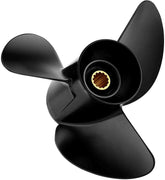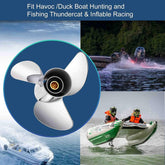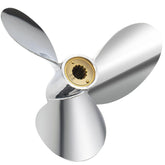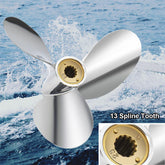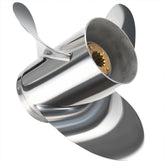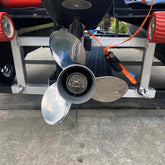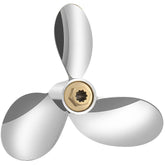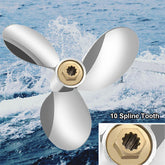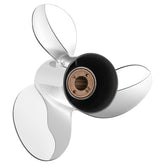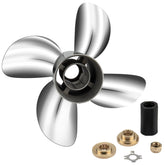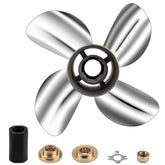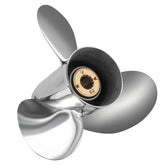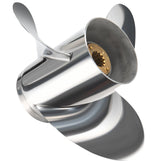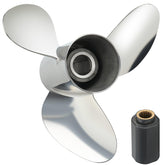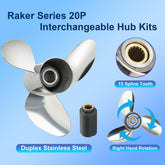Aluminum vs Stainless Steel Propeller
I've been around boats my entire life, and if I have learned one thing, it's that a well-chosen propeller can make all the difference in your time out on the water. Your prop material is not simply one of those little details in making a decision about everything from the performance of your boat down to your wallet.
When you're shopping for a propeller, you'll quickly realize there are two main contenders: aluminum and stainless steel. Trust me, they're not created equal. Each has its own personality, strengths, and quirks that can significantly impact your boating experience.
Stainless Steel Propellers: Strength and Performance

Let me tell you, stainless steel is the heavyweight champion of boat propellers. It's like the high-performance sports car of the marine world—built tough and ready for anything.
Advantages of Stainless Steel Propellers
Durability and Strength: If you're someone who pushes their boat to the limits, stainless steel is your best friend. These props laugh in the face of challenging conditions. Rocky waters? Turbulent waves? No problem. Where aluminum might bend or nick, stainless steel stands firm. I've seen these props take a beating and still perform like a champ.
Corrosion Resistance: Saltwater boaters, listen up. Stainless steel is your ultimate ally. While aluminum props start showing wear after a few saltwater adventures, stainless steel keeps on trucking. It's like having a rust-proof shield that protects your investment. Long-term value? Absolutely.
Improved Performance: Here's where stainless steel really shines. These props are engineered for speed and efficiency. They're stiffer, which means they hold their shape at high speeds. Better handling, quicker acceleration, and improved fuel efficiency—what's not to love? If you're chasing performance, this is your go-to option.
Disadvantages of Stainless Steel Propellers
But it's not all perfect. Stainless steel comes with a few drawbacks. First off, it's expensive. We're talking significantly more money than aluminum. If you're working with a tight budget, this might make you wince.
Also, while incredibly strong, stainless steel can be a bit brittle. It's more likely to crack than bend if you hit something. One bad encounter with a hidden rock could mean a costly replacement. And let's be real—those unexpected underwater surprises happen to the best of us.
The weight is another consideration. Stainless steel props are heavier, which can subtly affect your boat's performance, especially on smaller vessels. It's like adding a bit of extra baggage to your boat's diet.
Aluminum Propellers: Affordable and Versatile

Now, don't count out aluminum. For many boaters, these props are a solid, practical choice that won't break the bank.
Advantages of Aluminum Propellers
Affordability: Let's talk money. Aluminum propellers are significantly cheaper. For new boaters, weekend warriors, or anyone watching their spending, this is a big plus. You get a functional prop without emptying your savings account.
Lightweight Design: Weight matters on the water. Aluminum props are light, which can improve fuel efficiency, especially on smaller boats. They're easier to handle both in and out of the water—a nice bonus for those who aren't looking to do heavy lifting.
Great for Freshwater: If you're primarily cruising lakes and rivers, aluminum is more than capable. For leisurely fishing trips or casual weekend outings, these props perform admirably.
Disadvantages of Aluminum Propellers
But aluminum isn't without its challenges. These props are more vulnerable to damage. A single encounter with a rock or some underwater debris can leave noticeable dents or bends. They're like the more delicate cousin of stainless steel.
Saltwater is another nemesis. While they won't rust traditionally, prolonged exposure can cause significant corrosion. Ocean enthusiasts, take note—aluminum might not be your best long-term companion.
Performance-wise, they're good but not great. If you're after top-tier speed and efficiency, aluminum might leave you wanting more.
How to Choose the Right Propeller for Your Boat
Choosing between aluminum and stainless steel isn't a one-size-fits-all decision. It's about matching the prop to your specific needs.
Water Conditions: Freshwater mostly? Aluminum works great. Saltwater adventures? Invest in stainless steel.
Boat Usage: Recreational cruising? Aluminum is fine. High-performance or sport boating? Stainless steel all the way.
Budget: This is often the deciding factor. Stainless steel offers superior performance but at a premium price. Aluminum provides solid performance at a more wallet-friendly cost.
Performance Needs: Want to maximize speed and efficiency? Stainless steel is your answer. Looking for a reliable, economical option? Aluminum fits the bill.
Conclusion
At the end of the day, your propeller is a matter of personal preference. Stainless steel provides unparalleled strength and performance, ideal for the most demanding environments. Aluminum is an affordable, lightweight alternative that suits the needs of most recreational boaters.
Take your time, consider your specific needs, and choose wisely. The right propeller can make the difference between a good time on the water and an absolutely extraordinary one.


